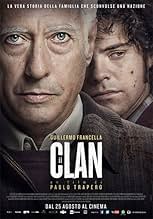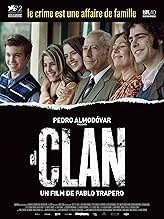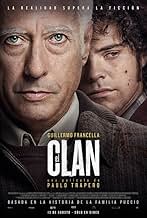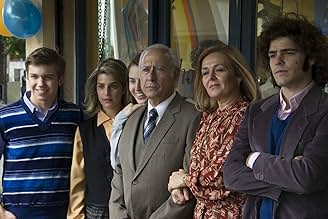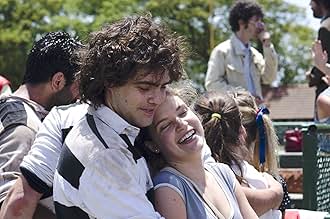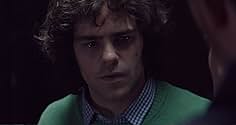AVALIAÇÃO DA IMDb
6,9/10
15 mil
SUA AVALIAÇÃO
A verdadeira história do Clã Puccio, uma família que sequestrou e matou pessoas nos anos 80.A verdadeira história do Clã Puccio, uma família que sequestrou e matou pessoas nos anos 80.A verdadeira história do Clã Puccio, uma família que sequestrou e matou pessoas nos anos 80.
- Direção
- Roteiristas
- Artistas
- Prêmios
- 15 vitórias e 38 indicações no total
Santiago Privitera
- Eduardo Aulet
- (as Juan Santiago Privitera)
Tomás De Las Heras
- Benito
- (as Tomás de las Heras)
- Direção
- Roteiristas
- Elenco e equipe completos
- Produção, bilheteria e muito mais no IMDbPro
Avaliações em destaque
My wife and I saw this film at the Louisiana Film Festival last night not knowing what to expect. Before I go on, my wife and I have totally different views and tastes when it comes to the art of film but this time we both came out of "El Clan" pretty satisfied. This film started off pretty slow but did get a little more riveting as it went on. There really were no big surprises or twists in this film. It was pretty much straight forward but got more interesting as the film went on. The story is simple; The Puccio Family, who is a model family on the outside, is a family that is in the business of kidnapping rich people for money and then killing them. Arquimedes Puccio (Guillermo Francella) is a respectable store owner who has an adoring wife and five respectable kids but all of this is a front for what they really do, simple but good. The acting in this film was great, especially from Guillermo Francella who played the part of Arquimedes Puccio, the totalitarian leader of "El Clan". The program director for the film festival mentioned, because this film didn't win or get a nomination for the foreign film category at the Oscars, Twentieth Century Fox decided to drop it, which is a shame because it's actually a decent film. I had no regrets seeing it.
The film hits from the real and moves the focus on one of the children who suffer most acts of his father, who embodies a sober Franchella that has long been demonstrating his talent for drama also. Format images first constant level remains stuck at viewer will not regret it in the film, which will feel some concern that under the aspects of normalcy can hide eyesores, this very well managed by the principal. I did not like the supporting performances and the appearance of the wife could have been more widespread. Compared to other good films of Argentine cinema may have lacked artistic details that make it more blockbuster, but certainly is a creation that will be a very good story in a story that is surprising.
Few years after the dictatorship in Argentina by Rafael Videla is overthrown, the remaining members of that military order begin a life of crime, using as an excuse that the Argentinians sold the country and pushed the patriots into catastrophe. At this time in history, is where the story of Arquímides Puccio (Guillermo Franchella) and his family take place. Puccio is an old retired military who starts kidnapping rich youngsters not just for the money, but to satisfy an evil mind that wants suffering. However, his five children, Alejandro (Peter Lanzani), Maguila (Gastón Cocchiarale), Silvia (Giselle Motta), Adriana (Antonia Bengoechea) and Guillermo (Franco Masini), are the ones who end up with the biggest sorrow. This brilliant movie is not a conventional crime thriller, it also explores the psychological illness of all the members in this family caused by the oppressing voice of Puccio's patriarchy. Alejandro, the brilliant and successful eldest child, is the connection between us and the pain inside the characters. The narrative of the story begins by the end, and so it goes interchanging present and future, until they collide in a sublime climax when all the feelings and thoughts of the children explode. Each one of the characters, even though they were real, are so astoundingly designed that you can feel the hate of the father; the indifference of the mother; the rage, the fear and even the love of the children. Another remarkable aspect of this movie is the BSO, featuring an accurate selection between The Kinks, Credence Clearwater Revival, and Argentinian rock of the 80's like Seru Giran and Virus. This is also a portrait of the post-dictatorship era as a fictional interpretation of the feelings of an old retired military, his new war, and his new army: his family.
The most colorful epoch of criminality in Argentina during Galtieri's military dictatorship era is brought to life in this story of a robber and criminal family . As this family kidnapped and killed people in the 80s in a period of economical crisis when any employment, even illegal, was cherished, ambition, money and power originated an interminable cycle of fury and violence. It deal with the Puccio family led by the honorable daddy called Arquimedes : Guillermo Francella , he is going as far as to supervise the homework of his youngest daughter as a dedicated teacher . His eldest son is Alejandro, -Peter Lanzani- , a Rugby star champion . But actually Arquímedes Puccio turns out to be the tyrannical leader of a bunch of delinquents composed of his spouse and children. As they along with some accomplices carry out undercover activities , consisting in abducting wealthy people , detaining them in his own home , mistreating and torturing them and doing away with them after cashing the ransom.
This is true story of the Puccio Clan, a model evil family , but their tale results to be a perverse stew of lies , violence , kidnapping , murders, pronounced bloodshed, sentimental blood bonding , and with a surprising ending . As an upright family -a model family whose well educated children have a promised and bright future- living their deep respectability , but is nothing but a smokescreen , being really a criminal group . The picture is plenty of thrills , intense drama , violence and thought-provoking issues . The main cast and support cast give magnificent interpretations . Here stands out Guillermo Francella who gives a masterful acting as the allegedly honest and dignified storekeeper by trade, who cares about his five children . As well as Peter Lanzani playing Alejandro Puccio , an admired rugby star .
The motion picture well well produced by EL Deseo S.A. : Agustin and Pedro Almodóvar and professionally directed by Pablo Trapero . His films have covered the most important festivals, receiving critical acclaim and awards . Trapero is one of the biggest creative forces in Latin American Cinema .He has sat on the main Festival juries at Venice, San Sebastian and Locarno, among others . In 2014 he served as President of Un Certain Regard in Cannes. In 2015 the Ministry of Culture of France awarded him Chevallier Ordre des Arts et des Lettres, becoming the first south american director in receiving this honor. In 1999 Trapero directed his first feature, Mundo Grua, which won the Critics Prize at Venice. In 2002, he opened his production company, Matanza Cine, that produces films for fellow filmmakers, as well as his own. His second feature, El Bonaerense (2002) premiered at Cannes, Familia Rodante (2004) at Venice, and Nacido y Criado (2006) at Toronto. In 2008, Leonera, presented in Competition at Cannes, revealed the talent of Martina Gusman, muse, actress and producer of the cineaste. He returned to Cannes with Carancho (2010) and Elefante Blanco (2012), both in Un Certain Regard. Trapero is a good filmmaker , his best film was ¨Carancho¨, dealing with a slow burning exercise in moral decay and his usual actress results to be Martina Gosman who has worked in various film with him , such as : ¨Lion's den¨ , ¨Nacido y Criado¨ , ¨Carancho¨ and ¨Elefante Blanco¨ . This El Clan turns out to be a dramatic and provoking flick , an above average film and Argentina's official submission to Academy Award and it achieved several Prizes of the Argentinean Academy. With this his latest film, The Clan, he won the Silver Lion for Best Director in Venice International Film Festival . Indispensable and essential seeing for Guillermo Francella fans .
This is true story of the Puccio Clan, a model evil family , but their tale results to be a perverse stew of lies , violence , kidnapping , murders, pronounced bloodshed, sentimental blood bonding , and with a surprising ending . As an upright family -a model family whose well educated children have a promised and bright future- living their deep respectability , but is nothing but a smokescreen , being really a criminal group . The picture is plenty of thrills , intense drama , violence and thought-provoking issues . The main cast and support cast give magnificent interpretations . Here stands out Guillermo Francella who gives a masterful acting as the allegedly honest and dignified storekeeper by trade, who cares about his five children . As well as Peter Lanzani playing Alejandro Puccio , an admired rugby star .
The motion picture well well produced by EL Deseo S.A. : Agustin and Pedro Almodóvar and professionally directed by Pablo Trapero . His films have covered the most important festivals, receiving critical acclaim and awards . Trapero is one of the biggest creative forces in Latin American Cinema .He has sat on the main Festival juries at Venice, San Sebastian and Locarno, among others . In 2014 he served as President of Un Certain Regard in Cannes. In 2015 the Ministry of Culture of France awarded him Chevallier Ordre des Arts et des Lettres, becoming the first south american director in receiving this honor. In 1999 Trapero directed his first feature, Mundo Grua, which won the Critics Prize at Venice. In 2002, he opened his production company, Matanza Cine, that produces films for fellow filmmakers, as well as his own. His second feature, El Bonaerense (2002) premiered at Cannes, Familia Rodante (2004) at Venice, and Nacido y Criado (2006) at Toronto. In 2008, Leonera, presented in Competition at Cannes, revealed the talent of Martina Gusman, muse, actress and producer of the cineaste. He returned to Cannes with Carancho (2010) and Elefante Blanco (2012), both in Un Certain Regard. Trapero is a good filmmaker , his best film was ¨Carancho¨, dealing with a slow burning exercise in moral decay and his usual actress results to be Martina Gosman who has worked in various film with him , such as : ¨Lion's den¨ , ¨Nacido y Criado¨ , ¨Carancho¨ and ¨Elefante Blanco¨ . This El Clan turns out to be a dramatic and provoking flick , an above average film and Argentina's official submission to Academy Award and it achieved several Prizes of the Argentinean Academy. With this his latest film, The Clan, he won the Silver Lion for Best Director in Venice International Film Festival . Indispensable and essential seeing for Guillermo Francella fans .
Greetings again from the darkness. It seems inherent within human nature for kids to want to make their parents happy and proud. Most of the time the reverse is also true: the majority of parents want to be good role models for their kids. However, when the latter is not true, things can get pretty ugly
even frightening. Such is the case with the real life story of the Puccio family in Argentina.
Acclaimed Argentinean director Pablo Trapero (Carancho, 2010) gives us a look at the Puccio crime family, and in the process draws parallels between the political turmoil and re-structuring of Argentina as it returned to a democracy in the early 1980's.
The façade of the happy family makes for perfect public cover as horrendous crimes are perpetuated often in the basement of the family home. Arquimedes (Guillermo Francella, The Secret in Their Eyes 2009) is the father who often seizes on the celebrity of his rugby star son Alex/Alejandro (Peter Lanzani) to catch their victims off-guard. The family Modus Operandi is pretty simple: kidnap-collect ransom- kill. Arquimedes was known for his hospitality, often offering home-cooked meals to the victims as they were chained in the family basement. Quite a contrast to the brutality involved in the crimes.
The film raises many questions, and makes us wonder where the line of guilt is drawn between committing a crime, and simply looking the other way. It's presented as if Alex felt compelled to support his father's endeavors even though it caused major internal struggles for him. Certainly the mother/wife (an excellent Lili Popovich) made the conscious decision to do what was necessary. It's especially unsettling to see Arquimedes helping his daughter with her school work, while the most recent victim is shackled in the cellar.
As Argentina's Oscar submission for Best Foreign Language film, it didn't make the final cut, but it's absolutely at the level of the five nominated films. Fans of Scorcese and Coppola crime films will see the influences, and the film rates with such crime gems as A Prophet (2009) and Animal Kingdom (2010).
Acclaimed Argentinean director Pablo Trapero (Carancho, 2010) gives us a look at the Puccio crime family, and in the process draws parallels between the political turmoil and re-structuring of Argentina as it returned to a democracy in the early 1980's.
The façade of the happy family makes for perfect public cover as horrendous crimes are perpetuated often in the basement of the family home. Arquimedes (Guillermo Francella, The Secret in Their Eyes 2009) is the father who often seizes on the celebrity of his rugby star son Alex/Alejandro (Peter Lanzani) to catch their victims off-guard. The family Modus Operandi is pretty simple: kidnap-collect ransom- kill. Arquimedes was known for his hospitality, often offering home-cooked meals to the victims as they were chained in the family basement. Quite a contrast to the brutality involved in the crimes.
The film raises many questions, and makes us wonder where the line of guilt is drawn between committing a crime, and simply looking the other way. It's presented as if Alex felt compelled to support his father's endeavors even though it caused major internal struggles for him. Certainly the mother/wife (an excellent Lili Popovich) made the conscious decision to do what was necessary. It's especially unsettling to see Arquimedes helping his daughter with her school work, while the most recent victim is shackled in the cellar.
As Argentina's Oscar submission for Best Foreign Language film, it didn't make the final cut, but it's absolutely at the level of the five nominated films. Fans of Scorcese and Coppola crime films will see the influences, and the film rates with such crime gems as A Prophet (2009) and Animal Kingdom (2010).
Você sabia?
- CuriosidadesGuillermo Francella is more well known in Argentina as a famed comedian, in contrast with the dark character he portrays in this film.
- Erros de gravaçãoScenes involving trains were filmed near the Urquiza line, the only one of the Buenos Aires metropolitan network using the same electric rolling stock from the 70s. However, in one scene a train passes by rightward and it can be seen it's painted mustard with a gray strip, which is the painting scheme of the current private operator and not of the former Ferrocarriles Argentinos. However, other scenes do show trains with the characteristic "colibrí" yellow-blue-red scheme.
Other than that, the rail tracks show Pandrol clips fastening them to concrete sleepers. Neither of those were used until the 2000s.
- Citações
Arquímedes Puccio: I'm innocent.
Principais escolhas
Faça login para avaliar e ver a lista de recomendações personalizadas
- How long is The Clan?Fornecido pela Alexa
Detalhes
- Data de lançamento
- Países de origem
- Central de atendimento oficial
- Idioma
- Também conhecido como
- The Clan
- Locações de filme
- Empresas de produção
- Consulte mais créditos da empresa na IMDbPro
Bilheteria
- Faturamento bruto nos EUA e Canadá
- US$ 201.227
- Fim de semana de estreia nos EUA e Canadá
- US$ 12.519
- 20 de mar. de 2016
- Faturamento bruto mundial
- US$ 20.381.995
- Tempo de duração
- 1 h 48 min(108 min)
- Cor
- Mixagem de som
- Proporção
- 2.35 : 1
Contribua para esta página
Sugerir uma alteração ou adicionar conteúdo ausente

![Assistir a Tráiler [OV]](https://m.media-amazon.com/images/M/MV5BYWQwM2MxNWYtMGQwZC00MGVjLWJjZTYtYzBiMTk4Y2FkZmY4XkEyXkFqcGdeQXRodW1ibmFpbC1pbml0aWFsaXplcg@@._V1_QL75_UX500_CR0)


